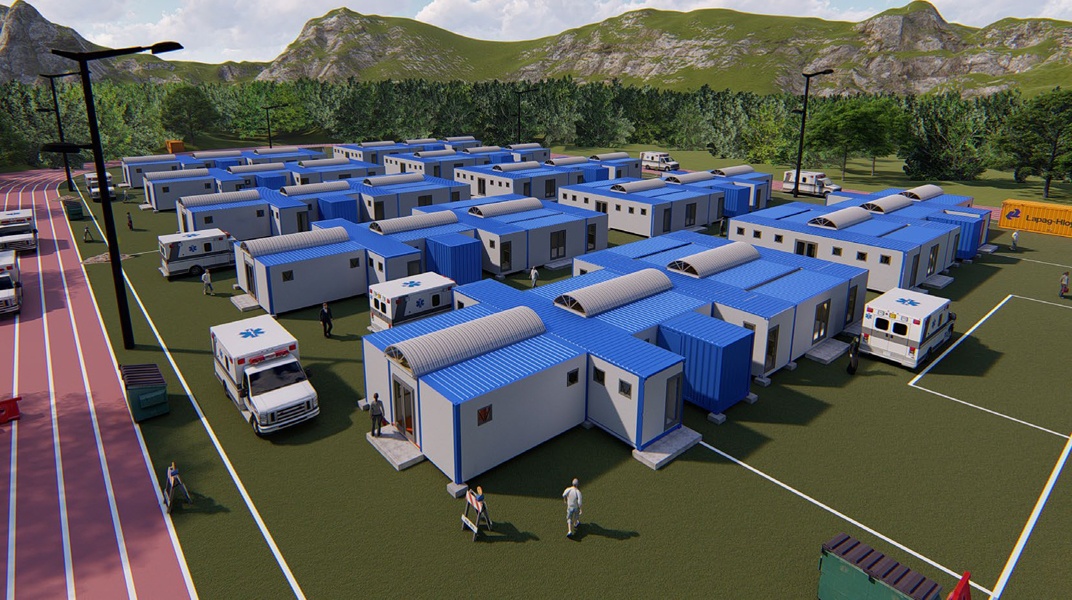The COVID-19 pandemic has put a large strain on healthcare systems throughout the world. EOH has heard President Ramaphosa’s urgent call for increased field hospital capacity and access to critical treatment facilities to treat COVID-19 patients across South Africa. In addition, hospitals in the Western Cape are starting to feel the pressure, with increasing reports of the need for field hospitals and beds.
As a broad-based enablement partner across the healthcare sector, EOH teams have been working on various solutions as part of the group’s SolveCOVID-19 programme.
Milton Streak, business executive within EOH said: “Supply-side innovation can strengthen the entire healthcare value chain and ensure the efficient allocation of resources. EOH is well placed to help South Africa respond to the dynamic shifts of this virus and navigate the business challenges that will emerge as a result of this pandemic. EOH has committed to working closely with government and the healthcare sector to identify solutions and technology to assist in the fight against the COVID-19 pandemic.”
The EOH Health Infrastructure Design team in particular have been working on a variety of isolation-ward combinations that can rapidly provide healthcare professionals with additional capacity. One of these, known as ICUlate, is an “intensive care and isolation ward in a box”.
ICUlate includes the complete spectrum of compliant infrastructure needed for both isolation wards and intensive care units, with the flexibility to easily downscale to accommodate either. It complies fully to international isolation ward and intensive care unit standards and can be transported easily to any location within Southern Africa.
Streak continued: “In South Africa, many of our people live in townships where there is high population density, insufficient nutrition, healthcare services and a limited supply of running water. The virus could spread rapidly in these environments. We need solutions that will help flatten the curve in these communities, as a failure to do so will be truly devastating. Rapid responses to slow the pandemic are required. Fully equipped, ready-to-go solutions, field hospitals and mobile ICU units can play an important role in managing the impact of this virus, especially in remote areas of our country. We’re hoping to roll out as many units as possible to assist in the fight against this disease.”
ICUlate units can be deployed as standalone temporary units on greenfields sites, existing ward conversions or bolt-on wards to existing facilities that can be removed or re-purposed as mobile clinics post COVID-19. The concept can either be an independent, fully functional containerised solution or a larger field hospital complex, or it can have its primary services retrofitted into an existing hospital or non-hospital facility, including non-traditional environments such as conference centres, sports fields or community halls. The ICUlate units are fully equipped with all the infrastructure and technology services such as HVAC, power, communication, lighting, nurses call, medical gas and water. Hospital equipment and furniture can be included as additions.
Ten ICUlate units are close to being deployed to Lesotho, and numerous retrofit projects are currently being carried out for the South African Department of Health. EOH is currently working on retrofit projects for two private and research hospital groups including Lenmed, to prepare them for the management of COVID-19 infections.
The ICUlate concept was designed in-house by Dihlase Consulting Engineers, a subsidiary of EOH based in their Cape Town office. The bigger emergency hospital facility was established as a result of collaboration between Dihlase and specialist hospital architects whom they partner with. The team collectively have over 200 years’ experience in hospital and communicable-disease facility design.
Mohammed Rawat, Regional Director at Dihlase, said: “Our ICUlate innovation is a purely South African design stemming from years of experience and in-depth research on infection control systems applicable to communicable diseases by our team. The knowledge gained from working closely with infection control specialists from the health sector was a huge factor in being able to finalise our design concept within three days. What is impressive about the ICUlate is that it is designed to be stand alone and mobile friendly. The modular design approach allows for flexibility and scalability, with off-site manufacture reducing costs and time while ensuring rapid deployment.”
In addition to the development of the ICUlate solution, EOH teams have, in line with the EOH SolveCOVID-19 programme, developed the Solidarity Fund web presence and launched a crisis management app called Sikhona, meaning we are here. This employee App and risk-management portal monitors employee wellness and allows the informed management of workspace and organisational risk.
Ends.
About EOH
The EOH Group is the largest technology business in Africa, providing the technology, knowledge, skills and organisational ability critical to Africa’s development and growth. Following the Consulting, Technology and Outsourcing model, the EOH Group provides high-value, end-to-end solutions to its clients in all industry verticals. The Group employs more than 8400 people, delivering technology solutions and knowledge services to over 5 000 large enterprise customers across all major industries. As a leader in driving and supporting digital innovation, the Group offers solutions along a simple. Design-Build-Operate engagement model through its two independent businesses, iOCO and NEXTEC.
EOH is proud to have supported and worked in assisting with the development of the Solidarity Fund website initiative and the Business for South Africa online presence.
For media queries:
Email media@eoh.com or call 011 607 8100.
For interviews contact:
Aprio strategic communications
Michael Rubenstein
011 880 0037 / 082 903 7797
Raksha Kassie
EOH Head: Group Marketing
083 317 8623
Raksha.kassie@eoh.com
